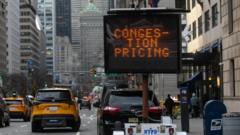Traffic in New York City has significantly decreased following the launch of the $9 congestion charge on January 5, as reported by the Metropolitan Transportation Authority (MTA). Officials revealed that during weekdays, approximately 273,000 fewer vehicles entered the bustling central business district, marking a 7.5% reduction in traffic compared to projections for January weekdays prior to the new scheme's initiation.
This groundbreaking congestion fee, which is the first of its kind in the United States, imposes a daily charge of $9 for car drivers, with variable rates for other types of vehicles. Encompassing an area south of Central Park, the congestion zone includes iconic landmarks such as the Empire State Building, Times Square, and Wall Street's financial district.
Janno Lieber, MTA's head, expressed satisfaction with the early results, indicating that New Yorkers have reported a notable decline in traffic, safer streets, and improved bus speeds. According to updates posted on X, motorists are experiencing time savings during their daily commutes, while local and express buses can navigate the city at a quicker pace, particularly during peak morning hours.
The initiative, aimed at mitigating New York's infamous traffic issues, is also expected to generate considerable revenue for the public transportation system. Most vehicles are subjected to a $9 daily fee during peak hours, with reduced charges of $2.25 at other times. Small trucks and non-commuter buses incur a fee of $14.40 during peak hours, while larger trucks and tourist buses face a higher charge of $21.60.
Despite the positive feedback from many residents, the congestion charge has not been without its critics, including President-elect Donald Trump, who has vehemently opposed the initiative, pledging to abolish the scheme upon assuming office later this month. Last year, New York City was named the most congested urban area globally for the second consecutive year, according to data from INRIX, a traffic analytics company.





















